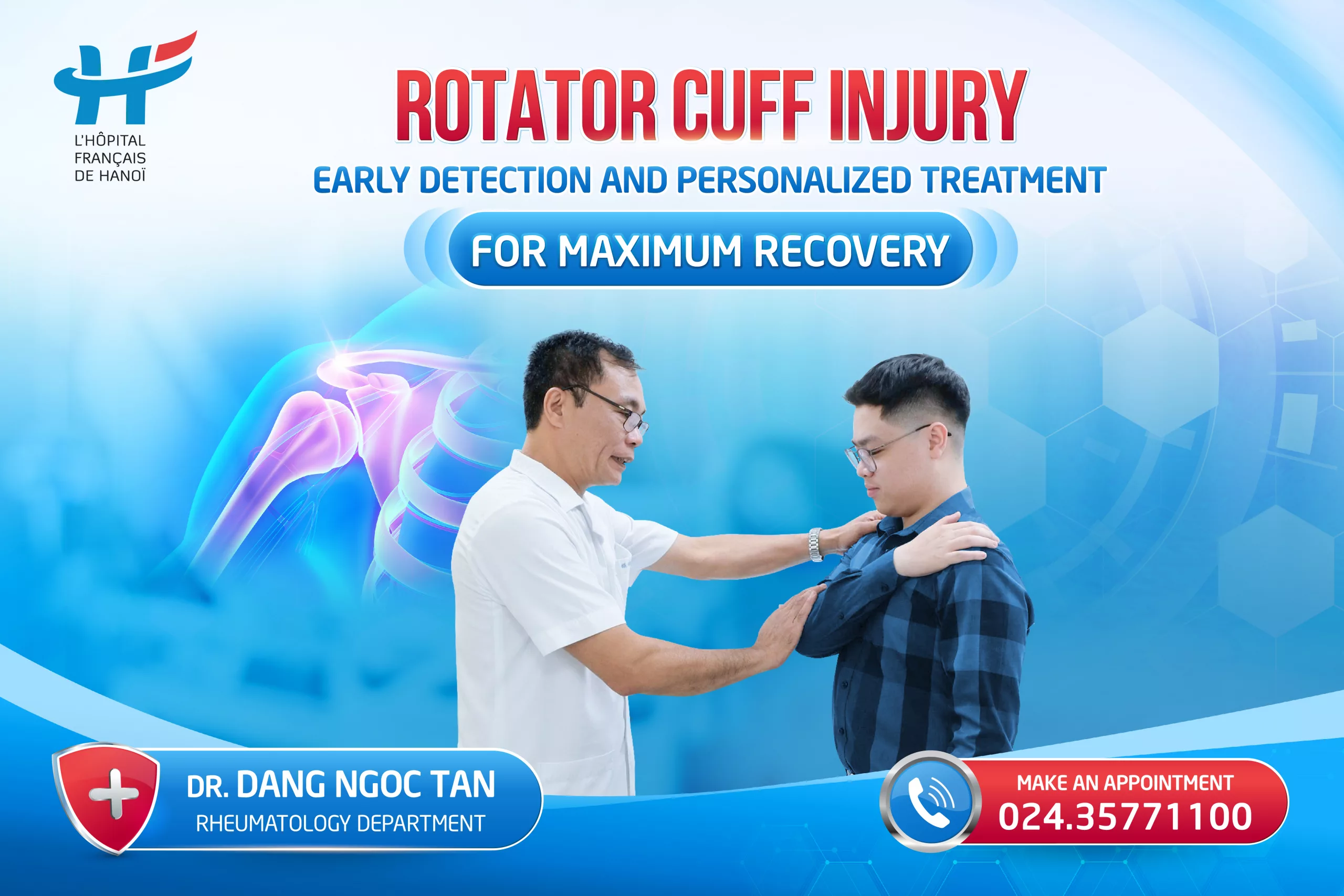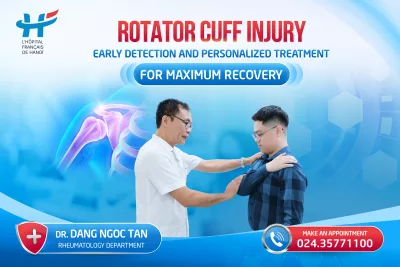The rotator cuff is a group of four tendons that surround the shoulder joint, helping to stabilize the head of the humerus within the glenoid and facilitating key movements of the joint, such as arm elevation and shoulder rotation. Rotator cuff injuries can involve tendonitis, partial tears, or complete tears, often resulting from age-related degeneration, trauma, or repetitive high-frequency activities.
Dr. Dang Ngoc Tan, Rheumatology Department – Hanoi French Hospital, shares: “Early detection of rotator cuff injury, particularly when the tendons are still in the inflammation phase, is crucial. With proper treatment, the injury can fully heal, preventing further tendon rupture or muscle atrophy, thus reducing the risk of surgery.”
Patients should consult with a specialist if they notice any of the following symptoms:
- Persistent dull or sharp pain in the shoulder, especially during movement or rest
- Weakness or difficulty lifting the arm
- A “cracking” sound when moving the shoulder joint
- Difficulty performing daily activities such as dressing or brushing hair
The primary treatment options for rotator cuff injuries include:
- Conservative treatment for tendonitis or small tears: Patient is prescribed pain relievers and anti-inflammatory medications (NSAIDs), combined with rest and physical therapy for shoulder rehabilitation.
- Corticosteroid injections may be prescribed if necessary, but should be used cautiously to avoid overuse.
- Surgery is considered for complete tendon tears, shoulder impingement, or when conservative treatment fails after approximately 12 weeks. Arthroscopic surgery can restore shoulder function and effectively alleviate pain.
At Hanoi French Hospital, rotator cuff injury diagnosis and treatment are managed not only by orthopedic specialists but also through close collaboration with other departments such as Imaging Diagnosis, Orthopedic Surgery and Traumatology, and Physiotherapy & Rehabilitation to provide a personalized, effective, and safe approach for each patient. Specifically:
- Ultrasound, X-ray, and MRI results of the shoulder provide detailed information about the extent of the injury, helping doctors make accurate and objective assessments.
- Physiotherapy and rehabilitation specialists assess joint function and recommend appropriate exercises to help patients recover shoulder function and prevent re-injury.
Patients and their families can trust that they are in good hands with our highly qualified medical team throughout the treatment process.:
Dr. Dang Ngoc Tan – Rheumatology Department, Hanoi French Hospital: Master of Internal Medicine in Rheumatology, Hanoi Medical University; trained at CHG Dreux Hospital, University of Paris VI (France); over 20 years of experience in treating inflammatory and degenerative joint conditions, especially in the shoulder and spine, with strong expertise in medical and conservative treatment of joint function.
Dr. François Duroux – Orthopedic Surgery and Traumatology Department, Hanoi French Hospital: Doctorate in Orthopedic Surgery and Traumatology – University of Toulouse (France); National Diploma in Shoulder and Elbow Surgery (France); more than 20 years of experience in treating shoulder, hand-wrist joint diseases, specializing in shoulder arthroscopy, shoulder replacement, microsurgery, and upper limb rehabilitation after injuries.
Dr. Nguyen Thi Dung – Head of Physiotherapy & Rehabilitation Medicine, Hanoi French Hospital: Resident doctor in Rehabilitation Medicine, Hanoi Medical University; advanced training in Thailand, Japan, and Austria; many years of experience in rehabilitation following injury or surgery.
For more information or to schedule an appointment with our specialists at HFH, please contact us via HOTLINE 024.35771100, inbox our fanpage “Hanoi French Hospital,” or Zalo OA zalo.me/2008009049335817955.


